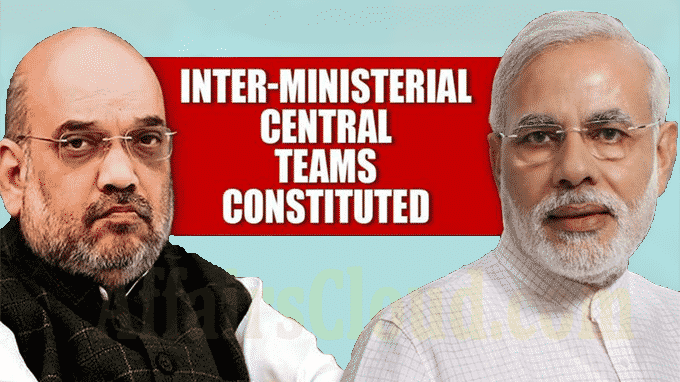On April 20, 2020 The central government under Section 35(1), 35(2)(a), 35(2)(e) and 35(2)(i) of the Disaster Management Act 2005 has formed 6 Inter-Ministerial Central Teams (IMCT), 2 each for West Bengal, Maharashtra and 1 each for Madhya Pradesh and Rajasthan. Objective
Objective
To make on-the-spot assessment of the situation and issue necessary directions to redressal of state authorities, to submit their report to the Central Government so as to fight and contain the spread of COVID-19.
Key Points
i.It is repeated & stressed about the strict implementation of the lockdown and other measures in all the orders on the lockdown measures & also in Guidelines/ Consolidated Revised Guidelines.
ii.The Governments of States/UTs are advised that they can impose stricter measures than these guidelines, but should not weaken the guidelines issued under the act.
IMCTs focuses on the following
i.On complaints & implementation of lockdown measures as per guidelines of the act, focus on issues like the supply of essential commodities, social distancing in movement of people outside their homes, preparedness of the health infrastructure, and hospital facilities.
ii.Sample statistics in the District, safety of health professionals, availability of test kits, Personal Protective Equipments (PPEs), masks, other safety equipment, and conditions of the relief camps for labour and poor people.
About Disaster Management Act 2005
It was established by Government of India on 23 December, 2005 to manage disasters, which includes preparation of mitigation strategies, capacity-building, natural calamity such as a cyclone or an earthquake among others which extends to the whole of India. As per this Act, National Disaster Management Authority (NDMA) was formally constituted on September 27, 2006.
Gist about Section 144
Section 144 of the Criminal Procedure Code (CrPC) of 1973 states that the Executive Magistrate of any state or territory can issue an order to prohibit the assembly of four or more people in an area then every member of the group can be charged for engaging in a riot. It is imposed when there is risk of emergency or nuisance or to control certain events that can cause problems or damage to human life or property.




